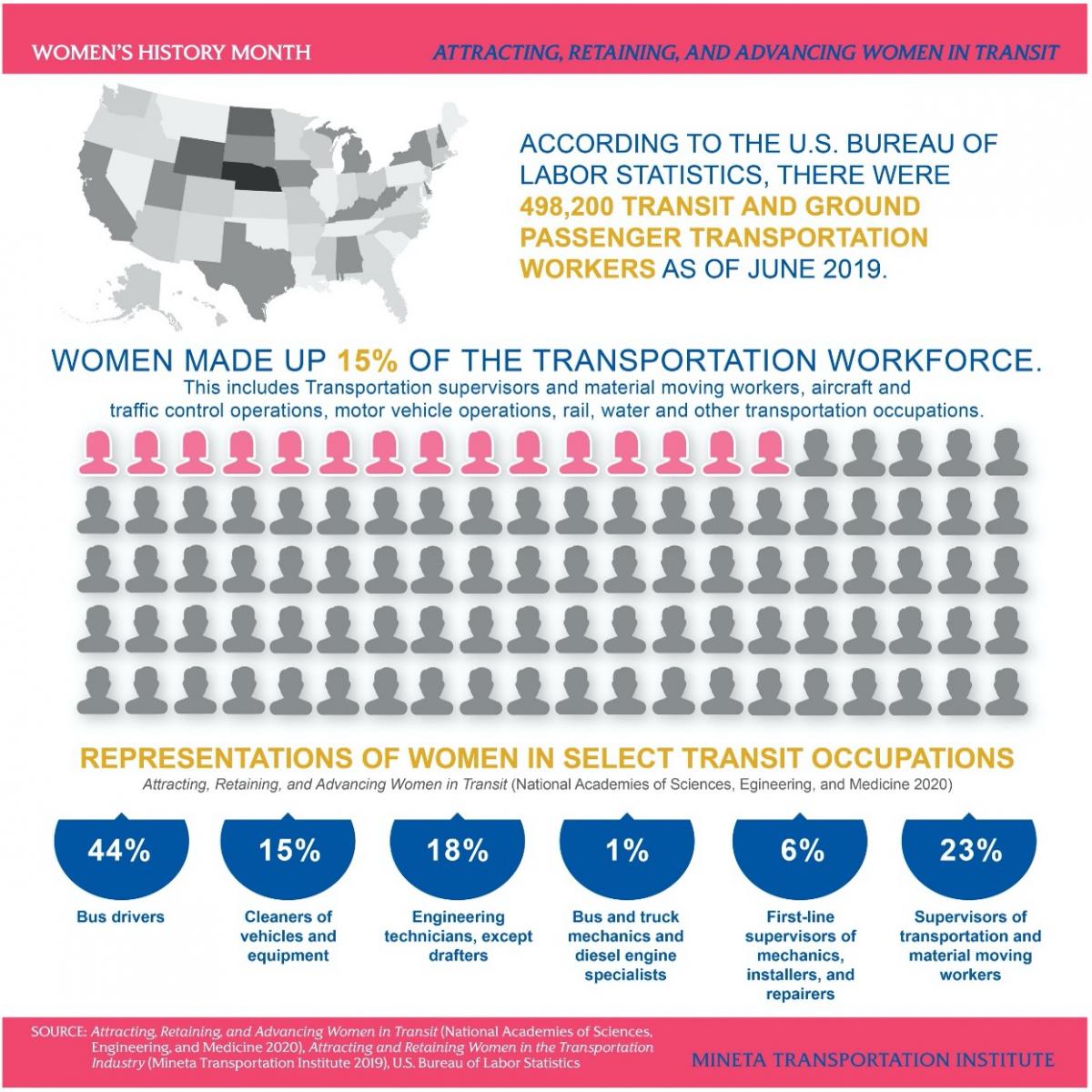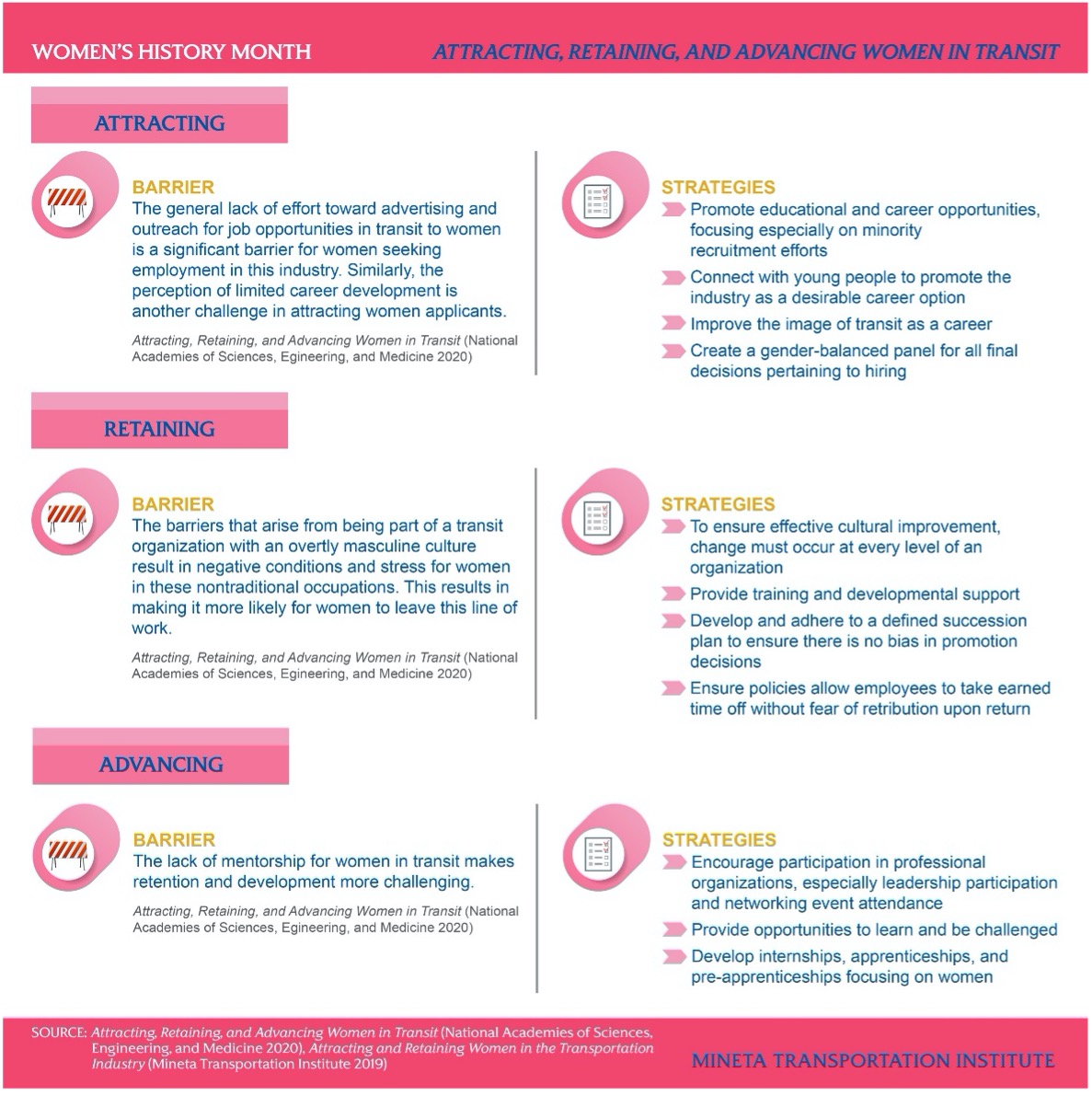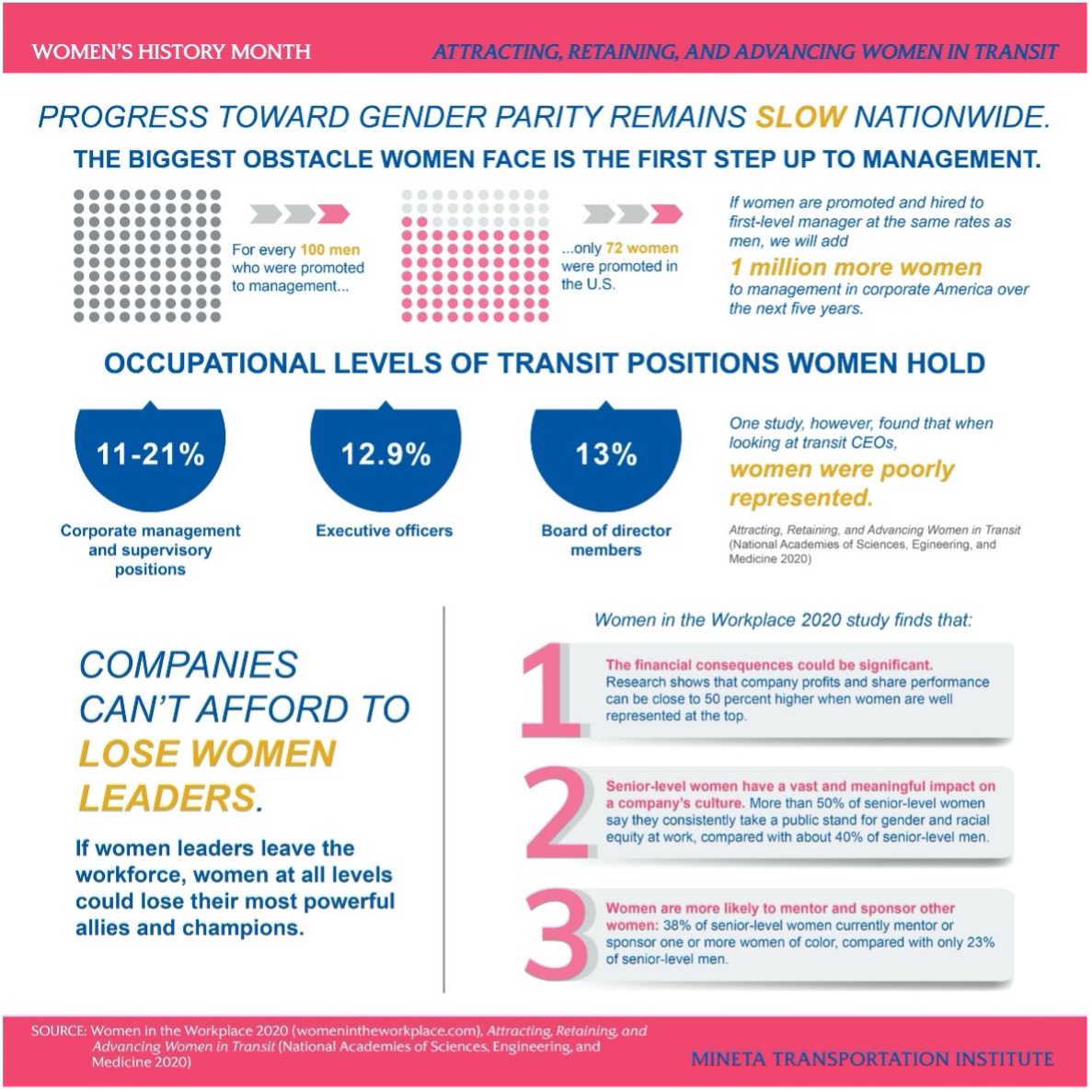- 408-924-7560
- mineta-institute@sjsu.edu
- Donate
Women Marching to the Top of the Transportation Industry
Gallup research on the benefits of gender diversity shows that men and women’s different viewpoints, ideas, and market insights enable better problem solving, which ultimately leads to superior performance at the business unit level. Gender-diverse workforces also possess wider industry knowledge, have access to more sources of information, and can more easily attract and retain talented women.
However, women have been historically underrepresented in the transportation industry, especially leadership positions. March is International Women’s Month and an ideal moment to review how this disparity affects the industry and people of all genders.

More than half of the U.S. population are women, and more than 50% of transit passengers too—but a 2019 report from the Mineta Transportation Institute revealed women make up less than 15% of all transportation workers, and the U.S. Bureau of Labor and Statistics reports women made up 24.1% of the “Transportation and Utilities” category in 2020—which includes sectors like trucking (12.4% women), air transportation (31.6%), and rail (7.4%), among others.
Research from the McKinsey Global Institute found that in the American workforce as a whole, for 100 men promoted to manager, only 85 women were promoted—with a much larger gap for women of color (58 Black women and 71 Latinas). At the highest tiers of the industry, the disparity in leadership is even more marked, with women making up only 12.9% of executive officers and 13% of board members.
Again, why?

While the explanation for the gender gap in the industry is of course complex and multifaceted, research has shown the main factors contributing to this disparity include general lack of outreach to women, social factors like a masculine-dominant work culture, safety and health concerns applicable to women, and challenges accommodating responsibilities outside of work. This last factor is especially significant in our current economic climate.
The events of 2020 have blurred the lines between home and work and left many families—including those in the transportation industry—worried about their finances as well as their health. But in the U.S., women—especially women of color—have been hit particularly hard. McKinsey research indicates women’s jobs are 1.8 times more vulnerable to the financial crisis than men’s jobs. Put in other terms, in the United States women ended 2020 with 5.4 million fewer jobs than they had at the beginning of the year, before the pandemic began—while men lost 4.4 million jobs over that same time period—a significant 22.7% difference.
Furthermore, with most schools across the country providing only virtual curriculum, parents (mostly mothers) are burdened with the emotional and financial choice of finding alternate childcare or staying home to care for the kids. Part of this disproportionate impact on women is the persistent cultural and social expectation that leaves them doing significantly more housework and childcare than men—meaning mothers working full-time jobs are essentially working double shifts. Decades of research indicate women consistently spend more hours in the day than fathers on housework and childcare, and mothers are more than three times as likely as fathers to be responsible for most of the housework and caregiving during the pandemic. Even more revealing, U.S. employers cut 140,000 jobs in December 2020, and women accounted for all the job losses—losing 156,000 jobs, while men gained 16,000. Almost all of these losses were jobs held by Black and Latina women. These women disproportionately work in sectors that have been most negatively impacted, such as hospitality, in roles that already frequently lack paid medical and family leave.
International women’s month in 2021, therefore, creates an unparalleled opportunity to address a multitude of disparities in the way women are attracted to and treated in the U.S. workforce, including the transportation industry. If companies seize the opportunity to make significant investments in recruiting, retaining, and promoting women and in creating a flexible, inclusive work environment, they can empower women to gain equal opportunity in the workplace and reap the many benefits of diversity and gender equity. Research has shown that benefits of increasing gender diversity in the workplace include a variety of organizational performance improvements such as increased sales revenue, more customers, and greater relative profits. Additionally, promoting women lays the groundwork for more opportunities as mentoring has been shown to help overcome gender and diversity barriers, and senior-level women are more likely to mentor women of color.

Our industry, and the economy, cannot afford to lose women. Gender equity is good for all genders, the economy, and society. Addressing existing intersectional gender inequities in the transportation industry has the potential to positively influence the way we move people and goods, and the way we understand and empower women—and everyone.
ABOUT THE MINETA TRANSPORTATION INSTITUTE
At the Mineta Transportation Institute (MTI) at San Jose State University (SJSU) our mission is to increase mobility for all by improving the safety, efficiency, accessibility, and convenience of our nations’ transportation system. Through research, education, workforce development and technology transfer, we help create a connected world. Founded in 1991, MTI is funded through the US Departments of Transportation and Homeland Security, the California Department of Transportation, and public and private grants, including those made available by the Road Repair and Accountability Act of 2017 (SB1). MTI is affiliated with SJSU’s Lucas College and Graduate School of Business.
ABOUT THE AUTHOR
Dr. Karen Philbrick is the as Executive Director of the Mineta Transportation Institute (MTI) at San José State University.
Media Contact:
Irma Garcia,
MTI Communications and Operations Manager
O: 408-924-7560
-
Contact Us
San José State University One Washington Square, San Jose, CA 95192 Phone: 408-924-7560 Email: mineta-institute@sjsu.edu





